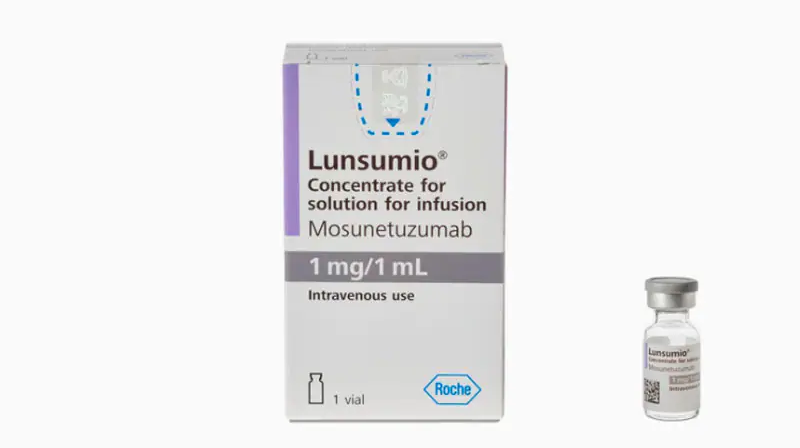Mosunetuzumab-axgb is granted accelerated approval for relapsed or refractory follicular lymphoma
Jan 2023: Mosunetuzumab-axgb (Lunsumio, Genentech, Inc.), a bispecific CD20-directed CD3 T-cell engager for adult patients with relapsed or refractory follicular lymphoma (FL) following two or more rounds of systemic therapy, received accelerated approval from the Food and Drug Administration (FDA).
In GO29781 (NCT02500407), an open-label, multicenter, multi-cohort study, mosunetuzumab-axgb was assessed. 90 patients with relapsed or resistant FL who had had at least two prior lines of systemic therapy, including an anti-CD20 monoclonal antibody and an alkylating agent, made up the efficacy population.
Objective response rate (ORR) was the primary efficacy outcome measure and was determined by an independent review facility using non-lymphoma Hodgkin’s standard criteria (Cheson 2007). 60% of respondents provided complete responses, and the ORR was 80% (95% CI: 70, 88). The estimated median duration of response (DOR) was 22.8 months (95% CI: 10, not reached) with a median follow-up of 14.9 months among respondents, and the projected DOR rates at 12 months and 18 months were 62% and 57%, respectively.
A Boxed Warning for serious or life-threatening cytokine release syndrome is present in the prescribing material (CRS). Neurologic toxicity, infections, cytopenias, and tumour flare are among the warnings and precautions. Mosunetuzumab-axgb was administered to 218 individuals with hematologic malignancies at the recommended dose. Of these patients, 39% experienced CRS, 39% experienced neurologic toxicity (including 1% with ICANS), 17% had significant infections, and 4% experienced tumour flare. Grade 2 occurred in 15%, Grade 3 in 2%, and Grade 4 in 0.5% of CRS participants.
The most frequent adverse responses (20%) in the 218-patient pooled safety population were cytokine release syndrome, tiredness, rash, pyrexia, and headache. Lessened lymphocyte count, lessened phosphate, increased glucose, lessened neutrophil count, moreened uric acid, lessened white blood cell count, lessened haemoglobin, and lessened platelets were the most prevalent Grade 3 to 4 laboratory abnormalities (10%).
Mosunetuzumab-axgb should be administered at a dose of 1 mg on Cycle 1 Day 1, 2 mg on Cycle 1 Day 8, 60 mg on Cycle 1 Day 15, 60 mg on Cycle 2 Day 1, and 30 mg on Day 1 in future cycles. A therapy cycle lasts 21 days. Unless patients exhibit severe toxicity or disease progression, mosunetuzumab-axgb should be given for 8 cycles. Patients who have shown a full response should stop medication after 8 cycles. Unless they have worsening disease or intolerable toxicity, patients with a partial response or stable disease should continue treatment for up to 17 cycles.
View full prescribing information for Lunsumio.
Dr. Nishant Mittal is a highly accomplished researcher with over 13 years of experience in the fields of cardiovascular biology and cancer research. His career is marked by significant contributions to stem cell biology, developmental biology, and innovative research techniques.
Research Highlights
Dr. Mittal's research has focused on several key areas:
1) Cardiovascular Development and Regeneration: He studied coronary vessel development and regeneration using zebrafish models1.
2) Cancer Biology: At Dartmouth College, he developed zebrafish models for studying tumor heterogeneity and clonal evolution in pancreatic cancer.
3) Developmental Biology: His doctoral work at Keio University involved identifying and characterizing medaka fish mutants with cardiovascular defects.
4) Stem Cell Research: He investigated the effects of folic acid on mouse embryonic stem cells and worked on cryopreservation techniques for hematopoietic stem cells.
Publications and Presentations
Dr. Mittal has authored several peer-reviewed publications in reputable journals such as Scientific Reports, Cardiovascular Research, and Disease Models & Mechanisms1. He has also presented his research at numerous international conferences, including the Stanford-Weill Cornell Cardiovascular Research Symposium and the Weinstein Cardiovascular Development Conference.
In summary, Dr. Nishant Mittal is a dedicated and accomplished researcher with a strong track record in cardiovascular and cancer biology, demonstrating expertise in various model systems and a commitment to advancing scientific knowledge through innovative research approaches.
- Comments Closed
- January 5th, 2023






Genentech, Lunsumio, mosunetuzumab-axgb, refractory follicular lymphoma
CancerFax is the most trusted online platform dedicated to connecting individuals facing advanced-stage cancer with groundbreaking cell therapies.
Send your medical reports and get a free analysis.
🌟 Join us in the fight against cancer! 🌟
Привет,
CancerFax — это самая надежная онлайн-платформа, призванная предоставить людям, столкнувшимся с раком на поздних стадиях, доступ к революционным клеточным методам лечения.
Отправьте свои медицинские заключения и получите бесплатный анализ.
🌟 Присоединяйтесь к нам в борьбе с раком! 🌟